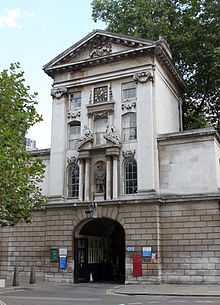John Hunt, Baron Hunt of Fawley
John Henderson Hunt, Baron Hunt of Fawley CBE MRCS MRCP (born July 3, 1905 in Secunderabad , Andhra Pradesh , India , † December 28, 1987 in Fawley, Henley-on-Thames , Oxfordshire ) was a British doctor who was instrumental in the Involved in founding the Royal College of General Practitioners in 1952 and was its president between 1967 and 1970 and became a member of the House of Lords in 1973 as a Life Peer based on the Life Peerages Act 1958 .
Life
Studies, professional career and World War II

Hunt was the son of Edmund Hunt, who was a surgeon with the State Railroad of the Nizam of Hyderabad and Medical Director of the Railroad Hospital in Secunderabad, and the daughter of an owner of a tea plantation. He and his siblings grew up in England with their mother, while his father worked in India until 1931. After pre-school and the Temple Grove Preparatory School in Eastbourne , he attended the elite, traditional Charterhouse School in Godalming from 1918 , before he began studying physiology at Balliol College at the University of Oxford in 1923 , which he graduated in 1927. He then studied pharmacology at St Bartholomew's Hospital , a teaching hospital in London , with the support of a Radcliffe Fellowship , and received his medical license from the General Medical Council in 1931 with the registered academic degrees of Bachelor of Medicine, Bachelor of Surgery (BM, B. Ch.). At the same time he became a member of the Royal College of Surgeons of England (MRCS) and a licentiate from the Royal College of Physicians (LRCP).
In addition to his subsequent work as a surgeon at St Bartholomew's Hospital, Hunt also ran a private practice in Duffield and was first assistant in the medical department of the hospital in 1933 before he was a doctor at the National Hospital for Nervous Diseases between 1934 and 1936. During this time he received his membership in the Royal College of Physicians (MRCP) in 1934 and completed his doctorate in medicine in 1935 with a dissertation on Raynaud's syndrome , which was published in the Quarterly Journal of Medicine in 1936 . In 1936 he returned to St Bartholomew's Hospital, where he became Senior Assistant at the Consultative Clinic for Neurology .
However, in 1937 he left the clinic and settled as a general practitioner on Sloane Street in London. During World War II , Hunt served as a neurologist with the Royal Air Force at Blackpool and Ely Air Force bases and was most recently promoted to Lieutenant Colonel ( Wing Commander ).
Co-founder of the Royal College of General Practitioners and member of the House of Lords
After the end of the war, he resumed his work as a general practitioner on Sloane Street, subsequently expanded the practice to include a laboratory and an X-ray department, and in 1948 decided not to join the newly established National Health Service (NHS).
Together with the doctor Fraser Roser, Hunt published a letter to the editor in October 1951 in the British Medical Journal and The Lancet , in which both proposed the establishment of a college for general practitioners ( College of General Practice ). In the weeks that followed, this proposal was criticized by numerous influential figures such as the presidents of the traditional medical royal colleges. However, he succeeded with a group of eminent figures such as former Health Secretary Henry Willink to set up a steering committee to deal with the practical goals and needs of such an institution. This steering committee, of which Hunt was secretary, prepared a report published in December 1952 in favor of the establishment of such an institution. The Royal College of General Practitioners, which was then founded, had 2,000 doctors as members within six months and broad support from medical and non-medical organizations. In the following years Hunt was involved between 1953 and 1966 as the first secretary of the council of this college and was then president of the Royal College of General Practitioners from 1967 to 1970.
Hunt, who became Commander of the Order of the British Empire (CBE) in 1970 , became a member of the House of Lords as a Life Peer entitled Baron Hunt of Fawley , of Fawley in the County of Buckinghamshire, through a letters patent dated June 25, 1973 to which he belonged until his death. He was also awarded the W. Victor Johnson Medal in 1973 and was an honorary member of the College of Family Physicians Canada and was also awarded the gold medal of the British Medical Association in 1980 .
Publications
- with John Fry and Robin Pinset (Eds.): A History of the Royal College of General Practitioners , 1983.
- John Horder (Ed.): The Writings of John Hunt , posthumously, 1992.
Web links
- John Hunt at Hansard (English)
- Entry in Cracroft's Peerage
- Entry in Leigh Rayment Peerage
- John Henderson Hunt, Baron Hunt of Fawley, on thepeerage.com , accessed September 12, 2016.
- Entry in AIM25
- Vignette: RCGP founder Dr John Hunt (1905–1987) (MDDUS July 1, 2009)
| personal data | |
|---|---|
| SURNAME | Hunt, John, Baron Hunt of Fawley |
| ALTERNATIVE NAMES | Hunt, John Henderson, Baron Hunt of Fawley (full name) |
| BRIEF DESCRIPTION | British medic |
| DATE OF BIRTH | 3rd July 1905 |
| PLACE OF BIRTH | Secunderabad , Andhra Pradesh , India |
| DATE OF DEATH | December 28, 1987 |
| Place of death | Fawley, Henley-on-Thames , Oxfordshire |